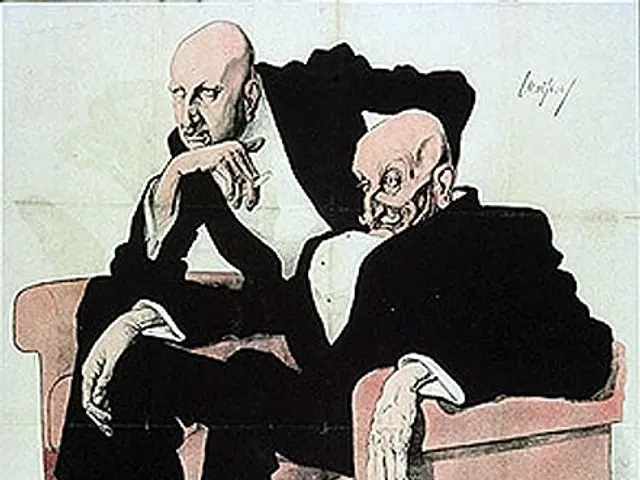Firing Back: Ex-President Wulff Pushes for AfD Review, Ban Debate Heats Up
Vice-President Wulff advocates for an investigation into potential AfD prohibition - Ex-President Wulff advocates for reconsidering the ban of the AfD party
In the wake of the AfD's classification as a clear right-wing extremist group, Christian Wulff, former Federal President, calls for a thorough review towards kicking off a party ban procedure. He raised the alarm at the Ludwig-Erhard-Gipfel in Gmund am Tegernsee, stating that the report from the Federal Office for the Protection of the Constitution evidences the AfD actively working against Germany's democratic and liberal fabric.
Additional Legal Insight Needed
Following the call for a review, further legal opinions are needed to expedite the initiation and completion of the party ban process within four years. Wulff emphasizes the importance of swift action in the face of the AfD's potential resistance, saying, "They'll be running around saying, 'Look at us, now we've passed the constitutional test, now we've got a hallmark.' We can't let that happen."
A Modern-Day NSDAP Saga?
Wulff drew parallels to the mishandling of the NSDAP in the Weimar Republic, remarking, "We should reproach ourselves today for how clever officials in 1930 failed to ban the NSDAP." He argued that an early ban of the brutal regime could have averted the Second World War and saved millions of Jewish lives.
The Drive to Protect the Motherland
If the review yields positive results, Wulff voiced his support for a ban application, stating that he's "in favor of a ban application, ban, and a battle against the AfD on land, sea, and air." Wulff implores Germans to safeguard their young democracy, which they embraced late in their history, with more passion than he's witnessed so far.
Last week, news broke of the Federal Office for the Protection of the Constitution's classification of the AfD as a right-wing extremist party, rekindling the ban debate. However, the political landscape remains divided on the matter.
- Christian Wulff
- AfD
- Classification
- Gmund
- Tegernsee
- NSDAP
- Democracy
- Ban debate
- Federal Office for the Protection of the Constitution
- CDU
Understanding the Ban Process:
The process of banning a political party in Germany is intricate, requiring several steps and high hurdles. Key aspects of this process include:
- Initiating the Ban: The ban process can only be initiated by the Bundestag (the federal parliament), federal government, or the Bundesrat (the upper house of parliament, representing the states).
- Constitutional Court Review: The request to ban a party is reviewed by the Federal Constitutional Court, entailing an in-depth examination of the party's activities and ideology.
- Two-Thirds Majority: The court requires a two-thirds majority for a party to be banned, ensuring that the decision is made thoughtfully and with broad judicial consensus.
- Judicial Independence: The final decision about banned parties lies with the judiciary. Politicians can submit a request for a ban, but they hold no sway over the court's decision.
Current Circumstances and Challenges:
- Classification as Right-Wing Extremist: The AfD's classification as a right-wing extremist party has reignited conversations about a potential ban. However, the AfD has disputed this classification in court, which has temporarily halted the process.
- Public and Political Reaction: The potential ban has sparked intense public and political discussions, with some fearing it could energize the AfD and embolden its narrative of victimhood if the Constitutional Court refuses to impose a ban. Others worry that the complex legal process may bolster the party's appeal.
- Political Considerations: The decision to pursue a ban is complicated by the AfD's status as a major opposition party and its popularity among some voters. Rushing to ban the party close to an election may invite accusations of political manipulation.
- Former President Wulff, citing the AfD's classification as a right-wing extremist group, advocates for initiating the party ban process, emphasizing the need for swift action to safeguard Germany's democratic and liberal fabric.
- The legal process to ban a political party in Germany is complex, necessitating steps such as the Bundestag, federal government, or Bundesrat initiating the ban, a review by the Federal Constitutional Court, and a two-thirds majority for the court to approve the ban.
- Despite the AfD's classification, the party has disputed this in court, temporarily halting the ban process. Public and political discussions have intensified surrounding the potential ban, with concerns that it could energize the AfD or bolster their appeal.
- Wulff raises concerns about politically motivated manipulation if the party ban is pursued too close to an election, adding another layer of complexity to the political landscape.
- Drawing parallels with the mishandling of the NSDAP in the Weimar Republic, Wulff argues for a more proactive approach in dealing with right-wing extremist parties like the AfD, stressing that early action could protect the young democracy and its people.






